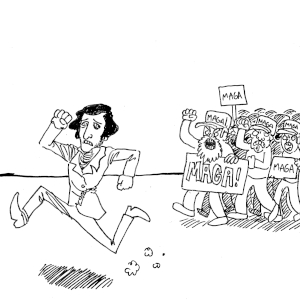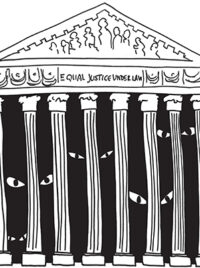Democracy in America Now
If democracy is government “of the people, by the people, for the people,” then there exists, to this day, a residuum of democracy in America.
It is found mainly at the local level, in towns and smaller cities, and even up to the scale of some of the smaller states. Even at these levels it is a democracy dominated, as democracies usually are, by money and land. Yet at these levels, it remains possible for citizens to be heard, to get the attention of public officials, to organize or litigate with effect on some issues, to win or lose on a referendum or a bond issue, and even to contest for public office with a chance of success. The amazing complexity of the typical American ballot – with page after page of offices to fill and decisions to make – is evidence of the relative openness of American life, at the local level, to democratic serendipity.

Artist: Pedro Camargo
In the larger states and cities, the forms of democracy are, generally speaking, placed in the service of oligarchy, lobbies, campaign finance, political dynasty, and party organization. Organized interests, though not entirely uncontested, dominate, frame the issues, and guide the policies. The media – increasingly monopolized at the level of the metropolitan media market – plays the role of minstrel to the local ruling class. Citizen engagement declines; access to the corridors of power is narrowed.
At the federal level, democratic practice is mostly symbolic. Only twice in living memory – the Civil Rights movement and the Vietnam war protests of the 1960s – have large-scale and sustained popular movements shaken the United States on a major public issue. Only once – in 1972 – has an insurgent candidate won the presidential nomination of the Democratic Party. On all subsequent occasions except one, the contest for the highest federal office has been stage-managed successfully by funders, consultants, and power elites. And this is increasingly if not yet comprehensively true of elections to Congress, where candidate selection and funding have become, to a large degree, the province of national party organizations rather than something to be left to the locals.
The corruptions and concentration of power wrought by money are well-known, but they are not the full story. Money can jump-start a democratic movement, as $250,000 from the GM heir Stewart Mott did for George McGovern in 1971[1]. (Similarly in 2024, Nicole Shanahan’s money kept Robert F. Kennedy jr. in the race for a time.) Nor is money necessarily decisive. Donald Trump notoriously prevailed in 2016 over candidates far better funded than he.
The decisive changes are in the structures of concentrated money and in the scope for contested ideas. To a degree not seen since Cotton was King[2], financial and therefore political power in America is now held by a handful of oligarchs – in finance, real estate, technology, entertainment, energy, pharmaceuticals and “defense” – who are now openly described as the “donor class.”[3] Elected officials spend their time courting this class, and bending their scruples, if they had them, to meet its desires. Power centers in the Congress – the “financial services committees” are a case-in-point – have grown in membership over the years, precisely so that their members can bring in contributions from the supposedly-regulated sectors.
The historical counterweights to the donor class – an organized industrial working class, an independent intelligentsia, the lawyers – have largely passed from the political scene, as the agrarian voices of late 19th century America – the original Populists – did before them[4]. Trade unions have declined in numbers and influence with the deindustrialization of the country. Big-city political machines, once powerful at the national level as Mayor Daley’s Chicago once was, have largely disappeared. The professorate – especially in economics, which is where politics and academics most intersect – now tends to use policy jobs to burnish resumes rather than, say, to conquer poverty. Retired diplomats seem largely to disappear; retired general officers go to work for military contractors and become part of the moneyed elite.[5]
Alongside the concentration of financial power, the oligarchy has moved to lock down control of the media – including social media, reflecting the effective privatization of the Internet. In television, a pseudo-diversity prevails, catering to different slices of the political demography with sharp differences on secondary topics – the identity and culture wars. The leading newspapers vector state propaganda, many of the others have faded or disappeared. “Democracy Dies in Darkness” – so reads the masthead of The Washington Post, a paper owned by an oligarch with deep ties to the information-security state, and whose pages sport multiple mouthpieces for the “communities” – as they are called – of the Pentagon and the CIA. The New York Times still uses “All the News that’s Fit to Print” on its masthead – another proof that irony died with democracy in America. Having at one point cooperated with Julian Assange to expose war crimes committed by American forces in Iraq – and numerous other matters of less gravity – the major media outlets were largely silent as he festered, for years, in an English prison on espionage charges.
On social media, aggressive and excessively popular expression of unwanted views can get you banned, or “shadow-banned.” The US government actively lobbies (read: directs) X (formerly Twitter), Facebook, Youtube and others to delete unwanted content, and the Supreme Court has upheld their “right” to comply. A medium that cannot be controlled by such pressure (Tik-Tok) can be banned or subject to forced sale to a more amenable oligarch.
A result is that on at least two crucial national issues – foreign military policy and monetary policy – effective means of dissent have vanished.
It is telling, for instance, that in the House of Representatives only one voice – Rashida Tlaib (D-MI) – speaks effectively for Palestine. And that only one – Marjorie Taylor Greene (R-GA), God help us – can be heard against the drive toward war with Russia over Ukraine[6]. If there is even one challenger to a policy of aggressive confrontation with the Peoples’ Republic of China, I’m unaware of who it might be. On monetary policy, what started as congressional oversight back in 1975 – in which I was closely involved as a young staff economist for the House Banking Committee – has become the Federal Reserve’s own platform for its views, reliably in the service of the banks and the global dollar. The last congressional dissent on that issue faded out with Ron Paul (R-TX).
In consequence of the narrow range of discourse, it became possible to obscure (for a time) President Biden’s decreasing mental capacity, to treat protesters against genocide in Gaza as anti-Semites, to maintain that Vladimir Putin determined the outcome of the 2016 election, and, more recently, to pretend for two years that Ukraine was heading toward military victory over Russia. As that last pretense unravels, it becomes increasingly evident that univocal control of narrative has led the United States into a dead end with catastrophic potential – to a choice between strategic defeat and nuclear war. It is precisely against such dangers, that democratic discourse is supposed to protect.
On a seemingly more innocent note, but one affecting the lives and livelihoods of millions, the idea that the money power should be kept far away from democratic politics has been a staple of mainstream economics for decades. The media therefore reports, by conditioned reflex, that the Federal Reserve serves public purpose (“fighting inflation”) while raising interest rates. The fact that this action directs interest payments to major banks on their vast holdings of liquid reserves[7]and to other holders of Treasury bills, goes largely unremarked. The banks, their owners, and other major holders of US debt do not complain. Meanwhile, high interest rates freeze the housing market, squeeze small and medium businesses, and price American exports out of world markets, thus undermining the objectives of energy and industrial policy, decided by Congress. Democracy be damned, where money rules.
In this context, the rise, fall and rise again of Donald Trump becomes easier to understand. Trump is a showman, a hotel and casino guy. He is prone to big talk and simple promises. In his first term his administration was hijacked by whichever faction (John Bolton, Mike Pompeo…) got close to him at any given time, though with a few professionals (notably in the military) narrowly keeping disaster at bay. But Trump is spontaneous, occasionally self-aware, and the horror he inspires in detested elites plainly incites admiration in the land. Otherwise, he would hardly have endured. Trump may well be a “threat to democracy,” but the notion is deeply laughable in the mouths of his political opponents who have worked for their entire careers, with great success, to consolidate their own power and destroy the remnants of democracy on crucial questions at the federal level in America.
There is – on the contrary – an undeniable element of genuine democracy behind Trump. His support has a strong element of resistance to the rule of oligarchs and entitled elites.The problem is that it is inconsistent, mean and even vicious in key respects; it is a democracy of the repressed and frustrated. It is not an organized movement of ordinary people. And Trumpian democracy, such as it is, is also unlikely to prevail, even if Trump is elected[8] – over the entrenched and permanent powers of money, the foreign policy complex, and information control. Instead the next Trump term will be an amalgam of the oligarchs who have taken his side (Elon Musk, Peter Thiel, Miriam Adelson…) and whatever establishment forces they come to terms with, once elected.
Still, despite the prevailing media view, Trump is the symptom, not the cause, of democracy’s decline in America. He is the outlet for an otherwise-squelched shout of protest, by people who perhaps do not know what they want, or if they did, how to achieve it. One cannot be happy with this state of affairs – but it’s not that difficult to understand. Democracy dies when small factions divert vast resources to narrow, petty, fruitless and deadly goals. It dies when genuine experiments, reforms, and visible improvements cease, and one is told that, sad to say, nothing can be done. Democracy dies when there is only one permitted way to think.
[1] This fact was known among McGovern staffers, including myself, at the time, and confirmed to me again by Senator McGovern on a visit to Austin in the early 1990s.
[2] For a reminder of how things were in the antebellum United States, see Matthew Karp, This Vast Southern Empire, Cambridge: Harvard University Press, 2018.
[3] The classic account of money and power in America is Thomas Ferguson, Golden Rule: The Investment Theory of Party Competition and the Logic of Money-Driven Political Systems. Chicago, University of Chicago Press, 1995.
[4] An excellent account of the Populists is Thomas Frank, The People, No. Metropolitan Books, 2020.
[5] In any event, it has been several generations since the United States military last prevailed in a major war, and there are (for better or worse) no retired senior military officers with the stature and credibility of an Eisenhower, a MacArthur, or others of that era.
[6] To be fair, J.D. Vance (R-OH) in the Senate, now the Republican candidate for Vice President, has also spoken out on occasion on this issue. So far as I’m aware, not a single Democrat – apart from the now-defected-to-Trump former Representative Tulsi Gabbard (D-HI) – has offered any words of caution against the drift toward war with Russia. Not even Bernie Sanders, ostensibly an independent. In a party whose heritage includes John F. Kennedy, Eugene McCarthy and George McGovern, this is astonishing.
[7] See my short essay, “Inflation Shamanism,” in Project Syndicate, at https://www.project-syndicate.org/commentary/federal-reserve-interest-rate-hikes-did-not-control-inflation-by-james-k-galbraith-2024-09#.
[8] At present writing in late October 2024 the election outcome is still highly uncertain.

